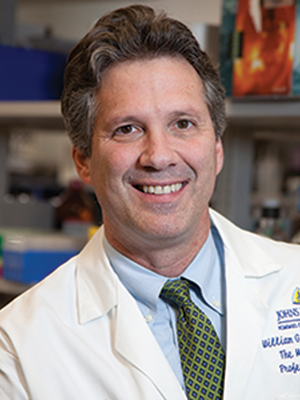
William G. Nelson, MD, PhD Photo by Joe Rubino
IN THE LATE 1800s, the renowned German microbiologist Robert Koch identified bacterial organisms as the cause of anthrax, cholera and tuberculosis. His discovery ushered in an era of vaccinations and antibiotics that have dramatically reduced mortality from acute infectious illnesses across the world.
Chronic infections–with human papillomaviruses, hepatitis B and C viruses, and Heliobacter pylori–can cause cancer. As was the case with acute infectious illnesses, understanding the role of infections in causing cancer has led to vaccinations and antibiotic treatment strategies poised to dramatically reduce the global burden of cervical, oropharyngeal, anal, liver and stomach cancers.
Over the past few years, scientists have come to a deeper understanding of how microorganisms can cause chronic human diseases, based on the recognition that each human body contains at least 40 trillion microorganisms. This collection of microorganisms (or microbiota) populates complex ecosystems in the skin, nose, mouth, stomach and intestines. These ecosystems are called microbiomes. Some 99 percent of the microbiota in the human body resides in the gastrointestinal microbiome, which is increasingly seen as a major determinant of health and disease–including cancer.
The composition of the microbiota in various sites can now be revealed by DNA sequencing analyses that provide a census of the different microorganisms in a microbiome, giving rise to a new field called metagenomics. What is now clear is that the intestinal microbiota is assembled by age 5, tends to be shared among family members, and can be transmitted across generations.
Diet exerts a dramatic effect on the microbiota of the intestinal tract, and the intestinal microbiome may be a major mediator of chronic conditions attributed to diet, like obesity and cancer. For obesity, the experimental evidence has begun to resemble some of Koch’s findings about microorganisms causing infectious diseases, although one difference may be that dysbiosis, an imbalance in the diversity and character of the many organisms in the microbiota, may be at the root of obesity, rather than a specific microorganism.
The mechanisms by which gut microorganisms contribute to cancer formation are just beginning to be understood. Cynthia Sears, an infectious disease specialist at Johns Hopkins now working on how intestinal bacteria may cause colorectal cancers, has identified one bug called Bacteroides fragilis as a particularly bad actor. This bacterium produces a toxin that damages normal intestinal cells, leading to a chronically inflamed intestinal microbiome prone to generate cancers. When Dr. Sears transferred the bacterium to mice inclined to develop benign intestinal polyps, the mice formed colorectal cancers instead. In a paper published this spring in Cancer Research, Dr. Sears and her colleagues reported that colorectal cancers associated with B. fragilis could be suppressed, not just by eradicating the microorganism, but also by reducing inflammation. This opens up new avenues for preventing colorectal cancers by altering the relationships between the microbiota and immune cells in the gut microbiome. Several other intestinal bacteria are also likely to affect colorectal cancer development. A gut microbiota rich in these pro-cancer bacteria may drive a microbiome toward chronic inflammation and cancer.
The influence of the intestinal microbiota on immune responses may even extend to how effectively the body’s immune system can be activated to fight cancers. Two recent reports in Science suggest that the presence of certain bacteria in the intestinal microbiome was accompanied by better anti-cancer responses to immunotherapy. The bacteria enhanced the effects of new immunotherapy drugs like Yervoy (ipilimumab), Opdivo (nivolumab) and Keytruda (pembrolizumab).
The study of the microbiome in the human intestine and at other sites is reaching a fever pitch. Hopefully, the future will bring answers to many questions being raised. Will altering the microbiota and microbiome be a cornerstone of cancer prevention and treatment? Can so-called probiotics be developed and demonstrated to improve health? What is a healthy microbiome and how can it be maintained? Finding answers to these questions may go a long way toward preventing and treating human cancers.
Cancer Today magazine is free to cancer patients, survivors and caregivers who live in the U.S. Subscribe here to receive four issues per year.




